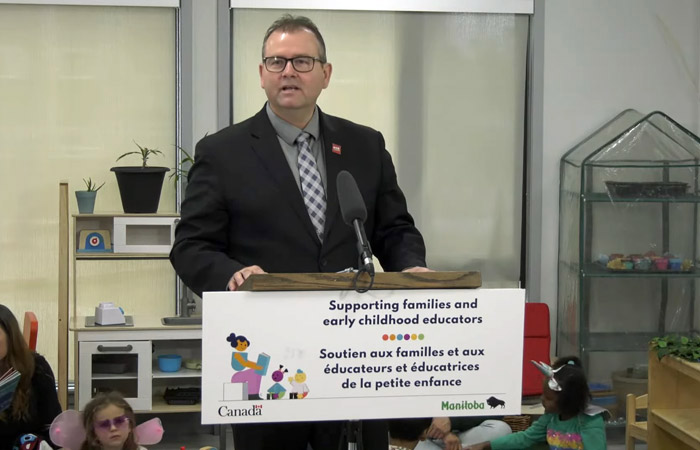The Manitoba government is increasing starting wages under Manitoba’s Early Learning and Child Care Wage Grid for the early childhood workforce in funded child-care facilities by $56.1 million effective July 1, 2023.
“By investing in early learning and child care, we’re investing in the future of our country,” said federal Minister of Families, Children and Social Development Karina Gould. “This wage enhancement will help attract and retain the best early childhood educators and child-care assistants, who are the cornerstone of the Canada-wide early learning and child-care system.”
Under the Canada-Manitoba Canada-wide Early Learning and Child Care Agreement 2021-2026, facilities will receive $52.8 million, through their existing operating grants that support early learning and child-care sector staff wages who care for children under the age of seven.
“Staff in child-care facilities across the province provide high-quality care that supports positive early childhood development, and this wage increase recognizes the importance of their crucial work,” said Manitoba Education and Early Childhood Learning Minister Wayne Ewasko. “In addition, ensuring early childhood educators and child-care assistants are well-compensated will help us recruit and retain more staff to address labour market shortages, as well as stabilize and strengthen the early learning and child-care sector.”
In addition, the Manitoba government is investing an additional $3.3 million to ensure staff working in school-age child-care programs are also fairly and consistently compensated.
Building on the introduction of the early learning and child-care wage grid in 2022 this additional increase will enable funded child-care boards and owners/operators to further develop fair, consistent and competitive wage scales. The increases announced today will bring the total funding for increased wages in Manitoba to $93.1 million over two years.
“The success of child-care expansion initiatives in Manitoba, including $10-a-day child care and new child-care spaces, directly relies upon the recruitment and retention of a qualified workforce,” said Ewasko. “This increase accounts for the existing need to elevate wages in the child-care sector to support the workforce recruitment and retention efforts underway, as well as recognizing forthcoming increases to the minimum wage.”
The wage grid establishes a starting point wage for a variety of position types or classifications and a target wage for facilities to work towards an average staff wage by July 2024. To help develop a comprehensive framework for early learning and child-care sector wages beyond the current wage grid, the Manitoba government will launch a request for proposals this spring for a consultant to conduct market research and stakeholder consultations and implementation planning, Ewasko noted.
The Canada-Manitoba Canada-Wide Early Learning and Child Care Agreement was signed in August 2021, and the five-year funding commitment is directed at building a Canada-wide early learning and child-care system. Manitoba will receive $1.2 billion in federal funding over five years to reduce the average out-of-pocket parent fees for licensed child care to $10-a-day and to expand access to more quality, inclusive child-care spaces for children under the age of seven.
The Manitoba government initiatives under this agreement focus on the unique needs of Manitoba families, communities and child-care providers and establish the building blocks to inform further development of these and other initiatives through consultation and engagement with parents and the early learning and child-care sector.



